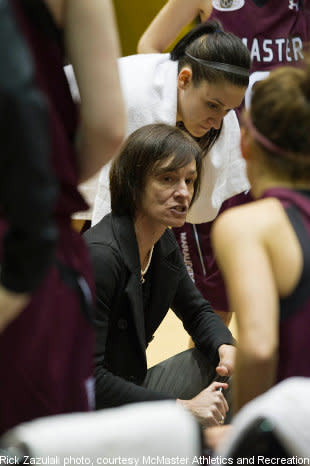Marauders’ women’s basketball team exits playoffs without concussed hockey-playing coach
It's rare when you see a head coach miss a crucial playoff elimination game in any sport. It's even more rare when they miss it because of an athletic injury they sustained in a different sport. Yet, that's what happened to McMaster University women's basketball head coach Theresa Burns, who missed the Marauders' crucial OUA quarterfinal match Wednesday thanks to a concussion suffered playing hockey on the weekend, an only-in-Canada moment. Without Burns, the Marauders fell 77-59 to the Western Mustangs and exited the OUA playoffs. It would be foolish to blame the result on Burns' absence, though; instead, both she and the school should be commended for doing the right thing and recognizing the effects of concussions, which can be tough to deal with even on the sidelines.
The typical response to injuries of any sort from most athletes and coaches is to suck it up and try and fight through the pain. At times, that perseverance can be commendable, and it's led to some of sports' most memorable moments. At other times, though, that focus on the short-term leads to severe long-term issues, and perhaps that's most true with concussions. Head injuries can haunt players long after their careers end, and they've been linked to terrible health issues over the long term. Moreover, plenty of research suggests that doing anything strenuous after a concussion can be quite dangerous, and that certainly includes coaching; although coaches may not be out there taking the shots themselves, they're still amped up and involved in the game, and maintaining a high level of passion, intensity and strategic thinking with a concussion can be very difficult. It's been well-established that players shouldn't return any time soon after being concussed, and applying the same guidelines for coaches seems most reasonable.
This incident shows that concussions aren't just something suffered at the elite levels of sports. They're something that can happen to anyone, and they can come from extreme sports, recreational sports or just day-to-day life. Sean Fitz-Gerald of The National Post recently had an excellent piece on another CIS women's basketball coach, Ryerson Rams' assistant Sue Stewart, who suffered severe brain injuries in 2005 after a slip and fall in a hotel shower on a coaching trip and is still battling back from that. Head injuries can happen to anyone at any time, and they need similar care and recovery times whether you're an elite athlete, a coach or someone not involved in sports at all. Hopefully Burns' unfortunate injury can help raise concussion awareness and show that it's not just athletes who can suffer them.
It's worth pointing out that Burns' record of toughness and success speaks for itself as well. She's been the coach at McMaster since 1992 and has led the team to six division titles, four OUA championships, and eight appearances in the CIS nationals. She's a cancer survivor who missed a whole season (in 2008-09) while undergoing treatment, but has fought back and led the team to success since. This was an impressive year for her program, as they bounced back to 11-11 in the regular season following a rough 6-16 campaign in 2010-11 and earned the right to host a playoff game thanks to an impressive late-season run. The loss to Western will hurt, and you can bet that Burns is choked up that she wasn't able to be there for it, but isolating a coach as the lone factor in a 18-point loss seems suspect.
Burns shouldn't be blamed for playing hockey on the side and suffering this injury, either; having an outlet to burn off some intensity is probably a good thing for coaches, playing recreational hockey is a perfectly Canadian thing, and it's just unfortunate that Burns got hurt this time. The school deserves credit for encouraging her to stay home, in accordance with medical advice, and she deserves credit for not shrugging off that advice to try and be on the sidelines. This particular story didn't end the way the Marauders would have liked, but they handled a difficult situation the right way, and maybe this will help to raise awareness of the dangers of concussions.

 Yahoo Sports
Yahoo Sports 


